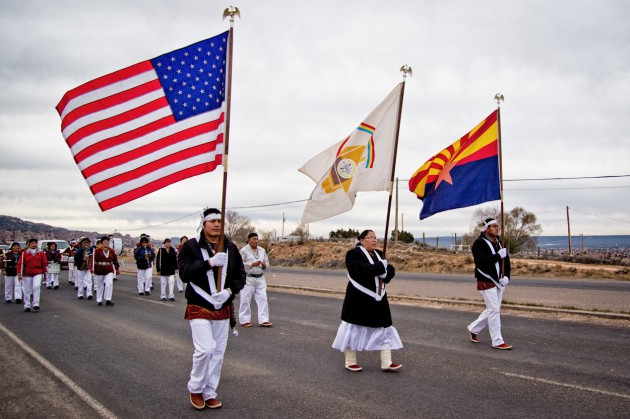Language as a Means or as an End: The Navajo Presidency
Should a president speak his indigenous language fluently? The Navajo core value system says yes, but the next Navajo President may need more than that.
Chris Deschene’s candidacy for the Navajo presidency has sparked much controversy. Born to a woman who, like many of her generation, was forbidden from speaking Navajo, Chris grew up speaking English, which his mother believed would provide him more opportunities.
His credentials, as reported by the New York Times, are impressive. He is a veteran of the Marine Corps, a lawyer, engineer, and former member of the Arizona House of Representatives. At a time when unemployment on the Navajo reservation is about 50%, he may have a lot to offer.
His command of the Navajo language, however, is far from stellar, and many of the Navajo tribe fear losing their language and culture. After all, a president serves as a role model and inspiration, as well as a diplomatic negotiator.
Navajo Nation at a Crossroads
Deschene’s candidacy has exposed a rift within the Navajo tribe. Some, especially the elder generations, are adamantly opposed to his candidacy, doubting he can fully embody and represent the Navajo identity without speaking the language.
In addition, many elder members of the Navajo government, who often dominate conversations, do not speak English and are appalled by the idea of not being able to communicate with their leader.
On the other hand, there are citizens like Jack Begay, 56, who told the New York Times that, while he regrets the decline of their culture, he supports Deschene because “We teach our kids to go out and get an education, and maybe one day come back and lead the Navajo people. That’s what Chris did.”
Language is central to a people’s culture and psychology, but can language alone influence who is and is not in poverty? On the other hand, is economic development reason enough to push language aside? It seems that a compromise must be reached.
A Latin American Example: Bolivia
Bolivia elected Evo Morales, its first indigenous President, in 2006, and he may well be approaching his third term following a constitutional change that makes an exception for the constitutional maximum of two Presidential terms.
Morales grew up speaking Aymara and learned Quechua, though according to La Capital he does not speak either fluently. Nevertheless, since entering office he has required all government officials to speak at least one out of the 36 indigenous Bolivian languages in addition to Spanish, depending on the official’s background and location.
According to the BBC, he remains very popular among poor and indigenous Bolivians. The Guardian reports that Bolivia’s indigenous majority have not only seen a cultural renaissance, but the Guardian also quotes UN statistics on poverty reduction that show the highest rates of improvement in Latin America.
Despite lacking mastery of Aymara or Quechua, Morales has visibly supported his Aymara origins and delivered on his promises to improve the lives of Bolivia’s indigenous peoples.
An East Asian Counter-Example: Japan
Japan may represent the very opposite situation from that of Navajo Nation and Bolivia. Completely closed-off until relatively recently and having never been ruled by a foreign power, most foreign cultural influx happens through appropriation rather than through literal colonization or invasion.
As a result, foreign language exposure is usually entirely optional. According to the Japan Times, in 2010, Japan’s average TOEFL scores were among the three worst out of 33 Asian countries.
A Prime Minister who speaks decent English is not guaranteed. The 2010 G8 Summit in particular proved frustrating to the Japanese public after then-Prime Minister Naoto Kan failed to mingle socially with the other leaders. Not only does it look terrible in video footage, but he may have also squandered an invaluable diplomatic opportunity (or several) for his country.
Former Prime Minister Yoshiro Mori, who now heads the 2020 Tokyo Olympic planning committee, is also under media scrutiny because of a career riddled with many culturally ignorant gaffes. The international public–whom he refuses to address in English despite his global, high-profile position–is already wary.
The Solution
It seems that the ideal presidential candidate would be fluent in both his indigenous language and English or another diplomatically prevalent language. Cultural literacy in indigenous and foreign cultures is also important, not to mention the expertise needed to address diverse economic, political, and environmental issues.
As it turns out, such ability is not as common as one would wish. Morales, however, has been quite successful in his presidency, and the practical and cultural prestige of an internationally spoken language is not to be underestimated.
If Deschene runs for and wins the presidency of the Navajo Nation, he would likely continue the public Navajo language education more rigorously than any man before him, which is key to reviving the Navajo culture and lifestyle. Regardless, the controversy of his campaign highlights the deeply intimate connection between identity and language. If you’re passionate about learning more about a culture or heritage, you can improve your language skills with a Language Trainers tutor. Contact Us to start your journey of cultural discovery and language mastery, or begin today by taking a free online language level test.

